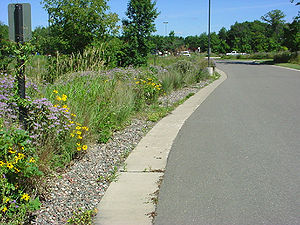
Difference between revisions of "Infiltration trench"
m |
m |
||
| (12 intermediate revisions by the same user not shown) | |||
| Line 1: | Line 1: | ||
| − | {{alert| | + | {{alert|Many of the following pages have been updated and the links below redirect you to the updated page. The old pages can be accessed from the redirect page.|alert-info}} |
Stormwater [[Glossary#I|infiltration]] practices capture and temporarily store stormwater before allowing it to infiltrate into the soil. Design variants include; the infiltration basin, the infiltration trench, the dry well and the underground infiltration system. As the stormwater penetrates the underlying soil, chemical, biological and physical processes remove pollutants and delay peak stormwater flows. | Stormwater [[Glossary#I|infiltration]] practices capture and temporarily store stormwater before allowing it to infiltrate into the soil. Design variants include; the infiltration basin, the infiltration trench, the dry well and the underground infiltration system. As the stormwater penetrates the underlying soil, chemical, biological and physical processes remove pollutants and delay peak stormwater flows. | ||
| − | [[file:Infiltration trench Lino Lakes.jpg|thumb|300px|alt=Photo of | + | [[file:Infiltration trench Lino Lakes.jpg|thumb|300px|alt=Photo of an infiltration trench in Lino Lakes|<font size=3>Photo of a Infiltration trench in Lino Lakes</font size>]] |
Infiltration practices are applicable to sites with naturally permeable soils and a suitable distance to the seasonally high [[Glossary#G|groundwater]] table, bedrock or other impermeable layer. They may be used in residential and other urban settings where elevated [[Glossary#R|runoff]] volumes, pollutant loads, and runoff temperatures are a concern. In applications where the stormwater runoff has a particularly high pollutant load or where the soils have very high Infiltration rates, a significant amount of [[Glossary#P|pre-treatment]] should be provided to protect the groundwater quality. Sources that include potential stormwater [[potential stormwater hotspots|hotsposts]] (PSH) should not be introduced to Infiltration areas. | Infiltration practices are applicable to sites with naturally permeable soils and a suitable distance to the seasonally high [[Glossary#G|groundwater]] table, bedrock or other impermeable layer. They may be used in residential and other urban settings where elevated [[Glossary#R|runoff]] volumes, pollutant loads, and runoff temperatures are a concern. In applications where the stormwater runoff has a particularly high pollutant load or where the soils have very high Infiltration rates, a significant amount of [[Glossary#P|pre-treatment]] should be provided to protect the groundwater quality. Sources that include potential stormwater [[potential stormwater hotspots|hotsposts]] (PSH) should not be introduced to Infiltration areas. | ||
| − | |||
| − | |||
| − | |||
<u><font size=3>Infiltration trench articles</font size></u> | <u><font size=3>Infiltration trench articles</font size></u> | ||
| Line 15: | Line 12: | ||
*[[Design criteria for Infiltration trench]] | *[[Design criteria for Infiltration trench]] | ||
*[[Construction specifications for Infiltration trench]] | *[[Construction specifications for Infiltration trench]] | ||
| − | *[[Operation and maintenance of Infiltration trench]] | + | *[[Operation and maintenance of Infiltration trench]] |
| + | *[[Assessing the performance of infiltration]] | ||
| + | *[[Calculating credits for infiltration trench]] | ||
*[[Cost-benefit considerations for Infiltration trench ]] | *[[Cost-benefit considerations for Infiltration trench ]] | ||
*[[External resources for Infiltration trench ]] | *[[External resources for Infiltration trench ]] | ||
| − | *[[References for | + | *[[References for infiltration]] |
| + | *[[Requirements, recommendations and information for using infiltration basin/underground infiltration BMPs in the MIDS calculator]] | ||
*<font size=3>[[Fact sheet|'''Fact sheet''']]</font size> | *<font size=3>[[Fact sheet|'''Fact sheet''']]</font size> | ||
| − | + | ||
| + | ==Related pages== | ||
| + | *[[Understanding and interpreting soils and soil boring reports for infiltration BMPs]] | ||
| + | *[[Determining soil infiltration rates]] | ||
| + | |||
| + | [[Category:Level 3 - Best management practices/Structural practices/Infiltration (trench/basin)]] | ||
Latest revision as of 16:25, 12 January 2023
Stormwater infiltration practices capture and temporarily store stormwater before allowing it to infiltrate into the soil. Design variants include; the infiltration basin, the infiltration trench, the dry well and the underground infiltration system. As the stormwater penetrates the underlying soil, chemical, biological and physical processes remove pollutants and delay peak stormwater flows.
Infiltration practices are applicable to sites with naturally permeable soils and a suitable distance to the seasonally high groundwater table, bedrock or other impermeable layer. They may be used in residential and other urban settings where elevated runoff volumes, pollutant loads, and runoff temperatures are a concern. In applications where the stormwater runoff has a particularly high pollutant load or where the soils have very high Infiltration rates, a significant amount of pre-treatment should be provided to protect the groundwater quality. Sources that include potential stormwater hotsposts (PSH) should not be introduced to Infiltration areas.
Infiltration trench articles
- Overview for Infiltration trench
- Types of Infiltration trench
- Design criteria for Infiltration trench
- Construction specifications for Infiltration trench
- Operation and maintenance of Infiltration trench
- Assessing the performance of infiltration
- Calculating credits for infiltration trench
- Cost-benefit considerations for Infiltration trench
- External resources for Infiltration trench
- References for infiltration
- Requirements, recommendations and information for using infiltration basin/underground infiltration BMPs in the MIDS calculator
Related pages
This page was last edited on 12 January 2023, at 16:25.
